Is someone close to you having a baby? Check out the nine most important rules for visiting a baby.
A new baby—what a blessing!
But in all of the excitement, it’s easy to forget that this is also a delicate time in the lives of the parents. In addition to recovering from the birth and adjusting to their new life, they’re sleep-deprived.
This is a time for them to get used to their new family dynamic. And to figure out a new schedule and routine that allows everyone to get some sleep. On top of all that, having visitors can strain their attempts to adjust to a whole new way of life.
With so much going on, remember to be extra thoughtful when you visit the baby.
Whether you’re a grandparent, relative, friend, neighbor, or even a coworker, you play an important role in the family’s life. So what can you do to have a pleasant visit and be the kind of visitor who gets invited back often?
It’s simple—follow these nine important rules for visiting a newborn!
This list is the Newborn Nine, and it takes into consideration the true (and often unspoken) needs of the baby, mom, and dad. The goal is not to alienate visitors, divide family, or make anyone feel unwelcome. The Newborn Nine exists to help friends and family members handle their visits with compassion and consideration for the new family.
The main things I ask from you? Please read this list with an open heart, don’t break these rules, never take anything personally, and when in doubt, always do what’s best for the baby.
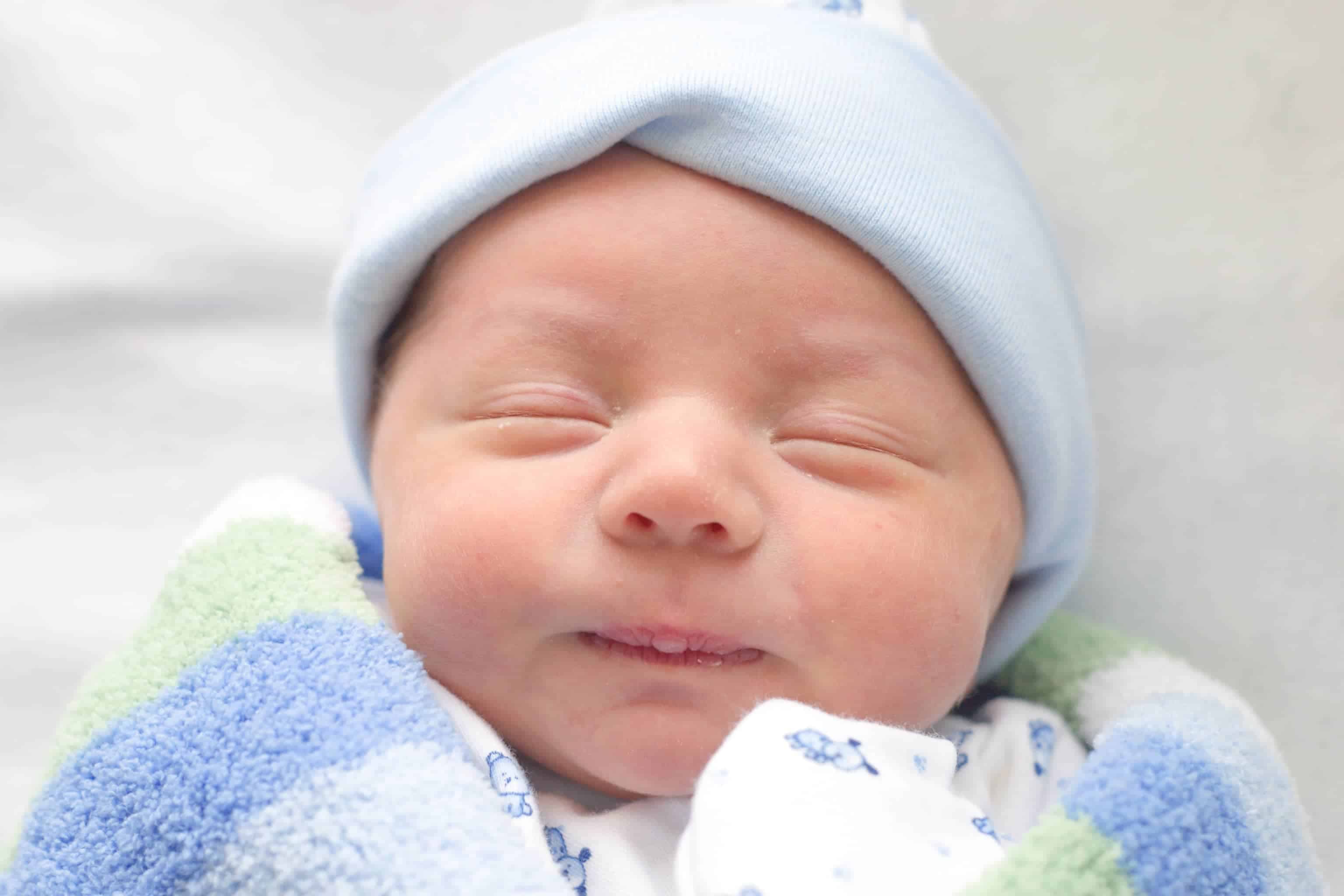
The 9 Most Important Rules for Visiting a Newborn
Here are the Newborn Nine rules to follow if you’re going to visit a family with a new baby. Remember, never make assumptions and always approach the situation with sensitivity and respect for the baby, mom, and dad.
Rule #1: Never Expose the Baby to Cigarette Smoke (or Any Other Type of Smoke)

Smoking is your choice, but exposing a newborn baby to the chemicals in cigarettes would be dangerous and irresponsible. If you smoke, you’ll need to do more than just smoke in a different room or wash your hands after you smoke.
Cigar, vape, or cigarette smoke lingers on your clothing, hair, and skin, so when you hold a baby, you would be exposing the baby to thirdhand smoke.
Thirdhand smoke is real—it occurs when residual chemicals (including nicotine) are left on surfaces that came in contact with cigarette smoke. It’s different from secondhand smoke, which is when you’re exposed to cigarette smoke from someone else who is smoking. Thirdhand smoke will be on surfaces like clothing, furniture, toys, vehicles, etc. and it has been shown to cause damage to DNA.
So, what do you do if you’re a smoker and you want to be around the baby? Follow these steps:
- Take a full shower (including washing your hair), brush your teeth, and change into fresh, clean clothes before you see the baby.
- After you shower, don’t smoke again before visiting the baby.
- Be prepared to hold the baby however the parents are comfortable, such as using a blanket or not at all, depending on their preferences. (Just follow the parents’ lead on this, and be open and respectful to whatever their preferences may be.)
If you are a close family member such as the grandparent or other close relative, and you can’t go several hours without smoking, here is an alternative (but less-desirable) option for you. Wear a long-sleeved shirt while smoking, then change into new clothes and wash your hands, arms, and face with soap and water and brush your teeth before visiting the baby. Again, please do not expect the parents to allow you to hold the baby, but if they do, be prepared to use a blanket.
It’s the parents’ choice as to whether they are comfortable having a smoker hold their baby. Personally, I would never let a smoker hold my baby, and I hope you can understand why most parents would be uncomfortable doing the same. It isn’t personal if you aren’t asked to hold the baby; it’s not you—it’s the chemicals.
If you are not a close family member or close friend and you can’t follow steps 1–3 listed above, it is best to wait to meet the baby. Try again when you are able to follow these steps.
(Note: rule #1 applies to vaping and marijuana, too.)
Rule #2: NO Fragrance or Perfume Around the Baby

Experts call fragrance the new second-hand smoke.
It’s true: scents of all kinds pose a health risk to babies. In addition to being an irritant, “fragrance” can include unhealthy ingredients that legally don’t even have to be disclosed. Many of these chemicals can pass through direct contact and enter the bloodstream.
When “fragrance” or “parfum” is listed as an ingredient, it likely includes a combination of chemicals. Some of these are linked to cancer, reproductive toxicity, allergies, and other sensitivities. Hundreds of additional chemicals can be hidden in a product when the label says “fragrance” on it. For example, one of the major concerns is phthalates in fragrances. Phthalates have been linked to endocrine disruption and reproductive toxicity, birth defects, breast cancer, infertility, obesity, diabetes, allergies, asthma, and more in children.
Phthalate exposure in males has been linked to lower sperm counts and altered sperm quality, and in females exposure can affect thyroid levels and alter thyroid function. –Made Safe
As if that weren’t enough reason to stop wearing fragrance in the presence of a baby (if not altogether), you should also consider the fact that it can aggravate a baby’s skin and may even contribute to eczema flare-ups or allergic reactions.
While some natural fragrances, such as essential oils, may be a safer alternative to synthetic fragrances, even essential oils aren’t safe for babies and young children. So play it safe, and don’t use any of the following products before you visit the baby.
Scented items to avoid include:
- Perfume
- Cologne
- Body spray
- Hairspray
- Scented hair products
- Aftershave
- Essential oils
- Scented candles
- Scented lotions
- Scented laundry detergents
- Scented dryer sheets
- Antibacterial or scented hand soaps
- Bug spray
- Plug-ins and air-fresheners
- Most cleaning products
Something as simple as painting your nails in the baby’s home or wearing your favorite perfume can expose the baby to harmful chemicals.
Please keep it simple and don’t use any fragrances on yourself or in the baby’s environment.
Rule #3: Don’t Visit if You Could Be Sick or Contagious
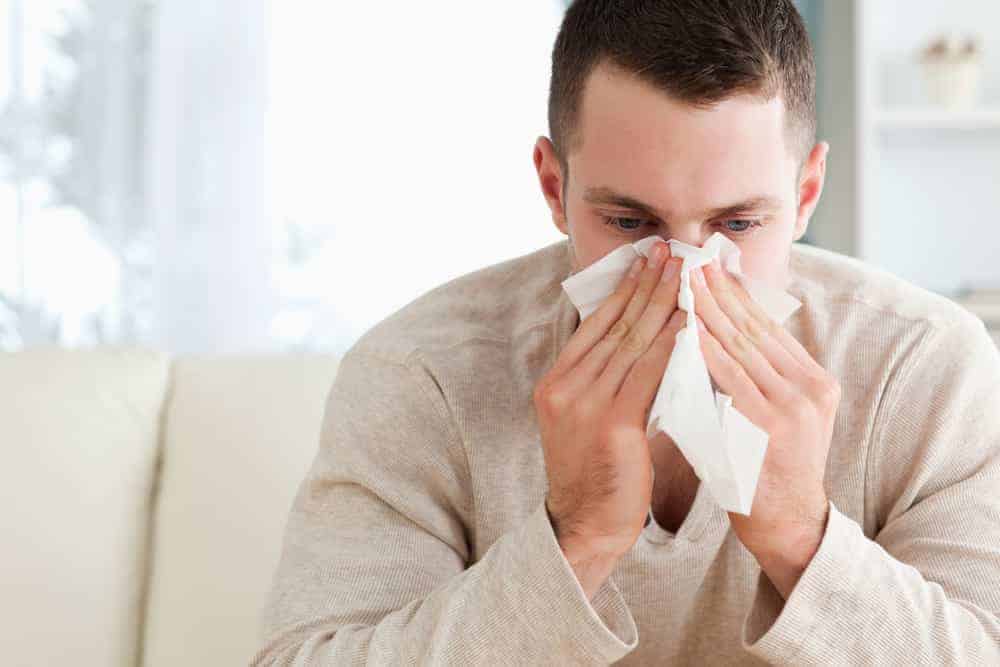
This is a no-brainer. If you’ve been sick, your kids or partner have been sick, or anyone you’re with on a regular basis is sick, you need to stay home. Even if there’s any remote possibility that you have been exposed to someone that is ill, could be sick or contagious yourself, or might have an outbreak or flare-up of any kind, you should reschedule your visit.
Even if you’re a relative, please wait until you’re better. Reschedule your visit! It’s best for everyone, and the new parents will greatly appreciate your consideration for their child.
While an adult or a school-aged child has likely been exposed to common viruses like RSV, rotavirus, enterovirus, and influenza several times in their life, a newborn hasn’t. So when you get sick, you may just get a sniffle but a baby is going to be especially vulnerable to what we might consider a minor cold or illness. In fact, getting sick can be lethal to a baby.
According to the New York Times:
Newborns don’t handle infection very well. Their immature immune systems leave them vulnerable to severe infections that can rage out of control. In the worst cases, bacteria get into the bloodstream, from a urinary infection or a skin infection for example, and cause bacterial sepsis. Or even worse, the bacteria leak from the bloodstream through the barrier that is supposed to separate blood and brain, causing meningitis.
Additionally, if a baby has a temperature of 100.4°F in the first 30 days of life, they must be admitted to the hospital and undergo urine catheterization, blood cultures, labs, and a spinal tap. Can you imagine being responsible for putting a newborn (and the parents) through this?
So don’t dismiss those sniffles or that little bit of diarrhea that “could be nothing.” Remember: a single sniffle or itchy throat may not be a big threat to you but can be very serious or even deadly for a baby.
It’s never worth the risk. You don’t want to be the reason a baby ends up in the hospital. Play it safe and save the visit for when you know you’re healthy. Ask the parents to skype or FaceTime until you’re better. It won’t hurt their feelings, and they will very much appreciate your care and concern for their baby.
Rule #4: Never EVER Kiss The Baby… EVER
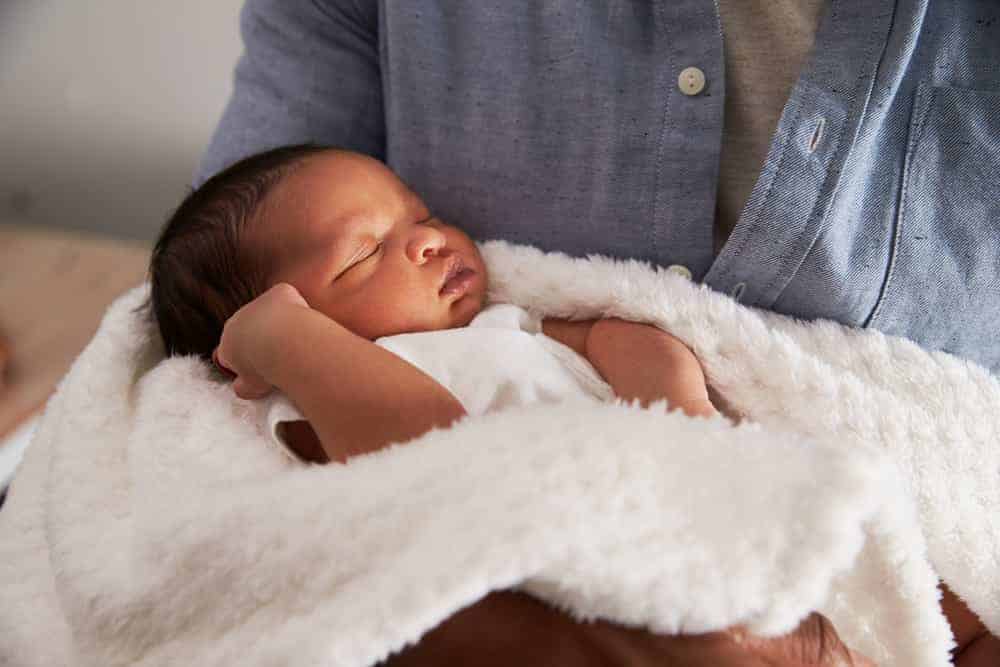
As tempting as it might be, never kiss a newborn under any circumstances. Ever.
In fact, don’t touch their face, lips, or hands, either.
I know this seems over the top and difficult to do. I have two kids, so I understand the desire to give the baby a kiss, but kissing a young baby can be very dangerous and cause serious health issues.
Here are some of the health risks that can be spread from kissing:
Herpes simplex virus (HSV-1). You can pass HSV-1 to anyone by kissing them. That’s one of the main ways the virus is passed from person to person.
Don’t think this applies to you? According to the World Health Organization, two-thirds of the world’s population carries the herpes virus. Evidence of this is present in people who have cold sores, “fever blisters,” and other recurring lesions in the mouth or on the tongue or lips. Many people also shed the virus asymptomatically and do not even know they carry it. The infection can be contagious even when the person does not have a cold sore present.
HSV-1 can cause serious health concerns for babies.
According to infectious disease specialist Camille Sabella, MD, when a newborn gets infected with certain viruses like the herpes virus, “it can quickly spread through their bloodstream and infect many of the different organs.”
Not convinced? Here are two very sad stories that illustrate just how serious this is. (Trigger warning.) This is one story of a baby who contracted herpes simplex from a visitor (read the story here), and here’s another story of an 18-day old baby who didn’t survive after contracting HSV-1 and viral meningitis from a kiss (read the story here).
So this is all to say—do not visit the baby if you have a cold sore present or are healing from one. Wait until it is fully healed. And even then, do not kiss the baby.
Some pediatricians even recommend visitors who are prone to cold sores wear a surgical face mask when visiting the baby (whether or not you have a cold sore present). If you will be visiting the baby often or for an extended period of time, you should also ask your doctor about taking prophylactic medication to reduce shedding of the virus and mitigate any risks to the baby.
Respiratory Syncytial Virus (RSV)
RSV is a viral infection that can make breathing difficult for babies. It is highly contagious, and since babies have smaller airways to start, any such inflammation can be dangerous or even fatal.
Other Illnesses
HSV and RSV are two serious diseases that can be caused when kids or adults kiss, cough, sneeze, or have saliva on their hands. And yes, there are many more illnesses to be aware of. You can pass a stomach virus; hand, foot, and mouth; or even colds, which may seem minor to you but wouldn’t be for a small baby.
For these very serious reasons, always follow the no-kissing policy when visiting a baby. And yes, this rule even applies to grandma and grandpa, 100%!
Rule #5: Ask Permission Before Taking and Posting Photos
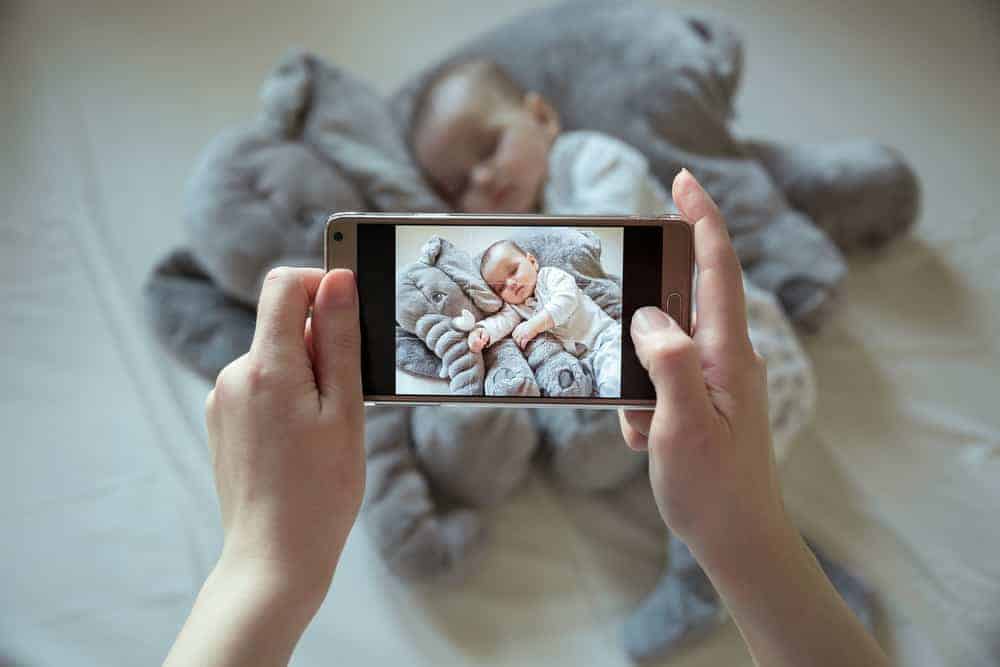
Before snapping any photos of the little cutie, please ask the parents if they’re comfortable with you taking the baby’s picture.
If they allow pictures of the baby, promise me that you won’t ever use the flash. That’s way too bright for a newborn’s eyes.
It’s also important to honor the parents’ wishes about posting pictures of their children online. Many parents don’t want their children’s photos shared on social media or uploaded to photo editing apps. For child protection and safety, you need to honor their wishes. Not just now—always.
It is not anyone’s right but the parents’ to determine what they want to do with pictures of their children. While I know it can be disappointing not to be able to share pictures of the baby (especially if you’re a close relative), you have to follow their lead on this because not all parents are comfortable with this—and for good reason.
Why? Aside from it being their decision, photo theft is a real thing.
Digital kidnapping (where someone steals a photo of someone else’s child and pretends it is their own) isn’t uncommon these days and children’s photos posted on Facebook have ended up on pornography sites. People do things with these photos that you could never imagine. It is shocking and sickening, yet it happens every day.
Finally, sharing photos may reveal the child’s location, making the child vulnerable. When you take a digital picture, image details such as the camera model, aperture, and shutter speed are recorded in the image’s “metadata.” This can also include the location the photo was taken and the GPS coordinates. (Smartphones typically record this information.) This means that someone who wants to figure out where the child lives may be able to do so by viewing the picture’s metadata. Some social media sites strip this information from photos when they are uploaded, but others do not.
Simply put—you have to follow the parents’ rules on this. Now and always.
And as a side note, if the parents haven’t yet announced the birth on social media, please don’t announce the baby’s birth. Don’t even share the baby’s name or sex without permission. It isn’t anyone else’s right to disclose these personal details but the parents’.
Rule #6: Wash Your Hands (Again!) Before Holding The Baby
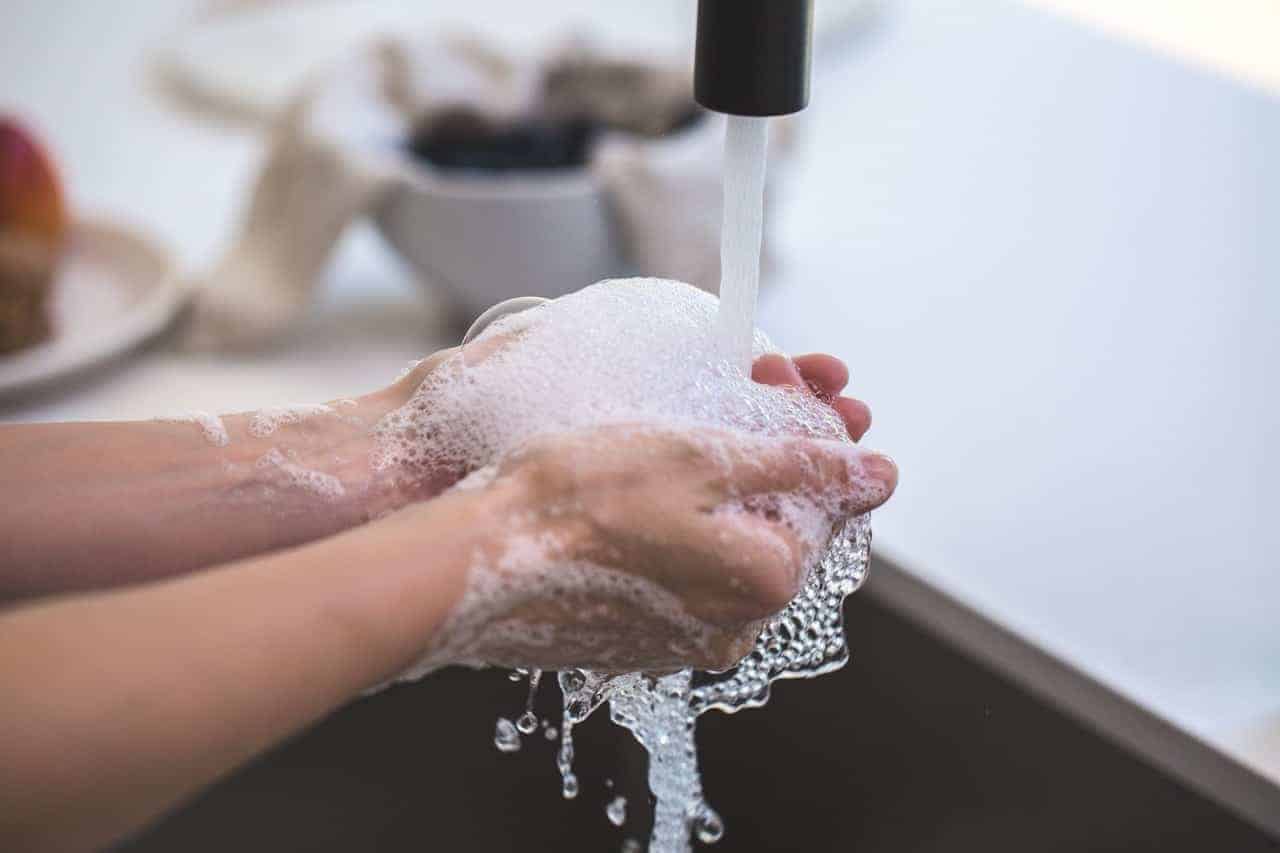
If the parents invite you to hold their baby, you must wash your hands first. ALWAYS, even if you just washed them 20 minutes ago. Wash them again right before holding the baby, and let the parents know you are doing it.
This rule applies to everybody.
And I say if because it shouldn’t be assumed that everyone gets to hold the baby. Truthfully, I don’t believe that babies should be passed around to friends and relatives. Newborns are just too sensitive to handle that. And if you think about it, because your face is right in their breathing zone, you can pass on colds and viruses just by holding them, even if you already washed your hands.
And while we’re on the subject, there are many other moms who feel the same way I do and don’t want anyone holding their baby. For example, if the mom is wearing the baby in a baby carrier, you should take that as a sign that she doesn’t want anyone holding or touching the baby.
Back to hand-washing… why do you need to wash your hands? Because babies don’t have strong immune systems. Even if your hands look clean, bacteria and viruses accumulate on them and can cause infections, even if you are not sick. For example, your cell phone is 10 times dirtier than a toilet seat.
If you hold or touch the baby and your hands aren’t clean, you are exposing the baby to dangerous germs.
As mentioned above, if a baby does get sick, their little immune system hasn’t matured enough to compartmentalize illness. Any infection can spread quickly to other organs and become a very serious situation. So, wash your hands right before you hold the baby! And don’t ever touch the baby’s hands, lips, or face.
Washing your hands isn’t hard to do and it doesn’t take long, but it can greatly help to decrease the chances of getting that precious little baby sick. A full 20-second scrub is what is needed to prevent the spreading of germs.
Rule #7: Always Give a Crying Baby Back to Mom
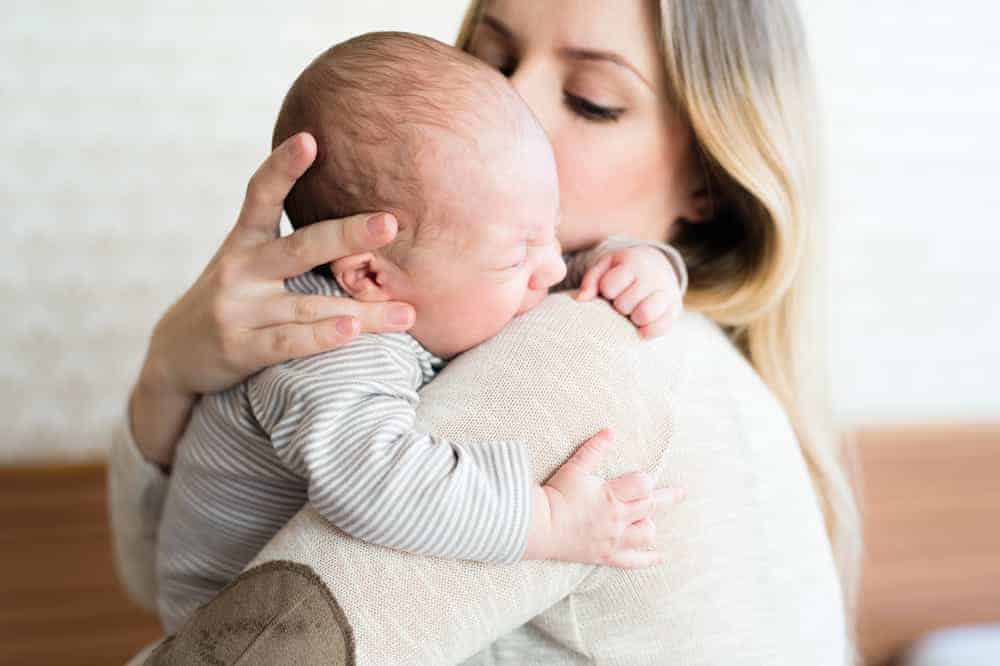
As much as you might want to help calm the baby when he is crying or fussing, give him back to his mom immediately. There is nothing more anxiety inducing for a new mom than to listen to her baby cry in the arms of someone else, knowing that the baby is probably crying because he wants his mom.
Mom’s hormones basically scream out “give me my baby” when she hears her newborn cry or express a need. A mom will know she wants her baby back, but it’s often challenging and awkward for her to communicate this to visitors.
She should never have to say, “Um, excuse me, can you please give me back my crying baby because he probably wants to be with me?”
So, if the baby is getting fussy or seems upset, at least ask mom if she would like her baby back or if she would be okay with you helping to soothe the baby. Or just assume that mom and baby need each other and hand that baby over to her mom.
There will probably be other opportunities for you to hold the baby when he’s not struggling with separation anxiety and is well rested, fed, and feeling happy again.
Rule #8: Respect the Parents’ Choices—In Everything
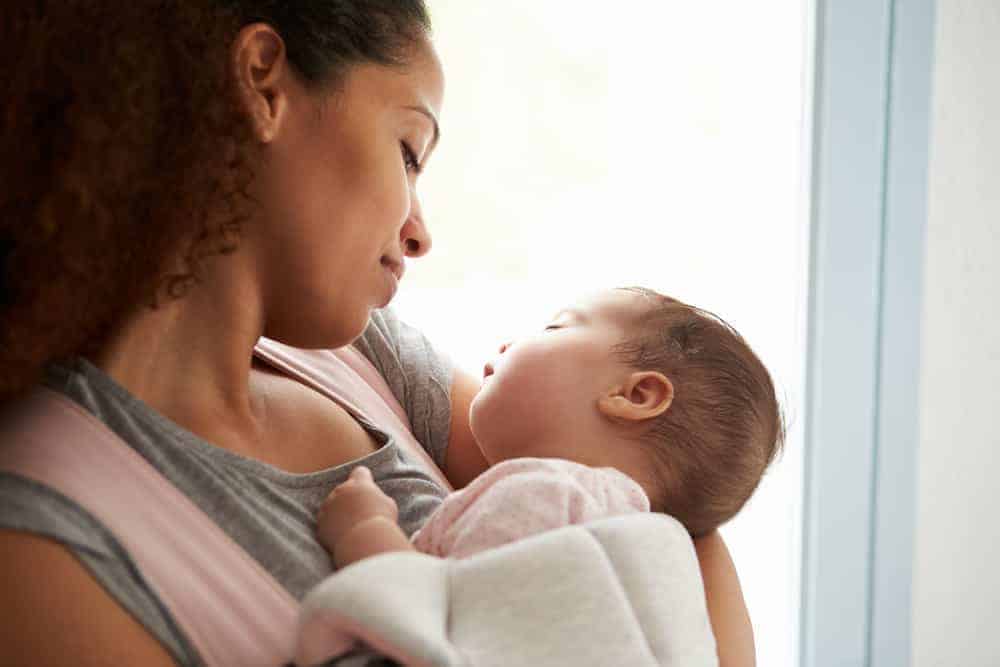
Meeting the baby for the first time should be about celebrating a new life. It’s not the time to question the parents’ decisions on how they feed their baby, when they will go back to work, or how they are planning to parent.
Simply put, everyone who visits a new baby needs to be respectful of the parents’ decisions. It isn’t an opportunity to give unsolicited advice or try to do things your own way. It’s also not the time for probing, giving lectures, or telling how you did things with your baby.
For example, if the mom is nursing, don’t bat an eye (and the same goes for parents using baby formula). If they practice respectful parenting and ask the baby if they can pick her up, please don’t treat them like they’re aliens. If they prefer wooden toys or 100% cotton clothing for the baby, those are their choices to make.
And they don’t need to be talked out of them. They’re raising their children how they want to.
Similarly, it’s not appropriate to tell the parents that their baby is spoiled, needy, or should be sleep trained or disciplined. It’s not your place, this isn’t the time, and they haven’t asked!
If the mom asks you for advice, share your thoughts, but be extra careful not to be judgmental. And be supportive of her choices (even if they are not what you would have done). Don’t overload her with every warning and piece of advice you can think of. There’ll be plenty of time for all of that advice!
The bottom line is this: the parents are the ones who get to decide how to raise and care for their baby. Even if you’re a grandparent or close family member, you have to honor their wishes (and you should also know that things are different since you raised your children). While we’re on the subject, never feed the baby unless the parents hand you a bottle and ask you to. And don’t give a 6-month old cake or eggs (or anything) behind their back.
Honor the parents and their wishes, always.
Rule #9: Keep the Noise Level Down
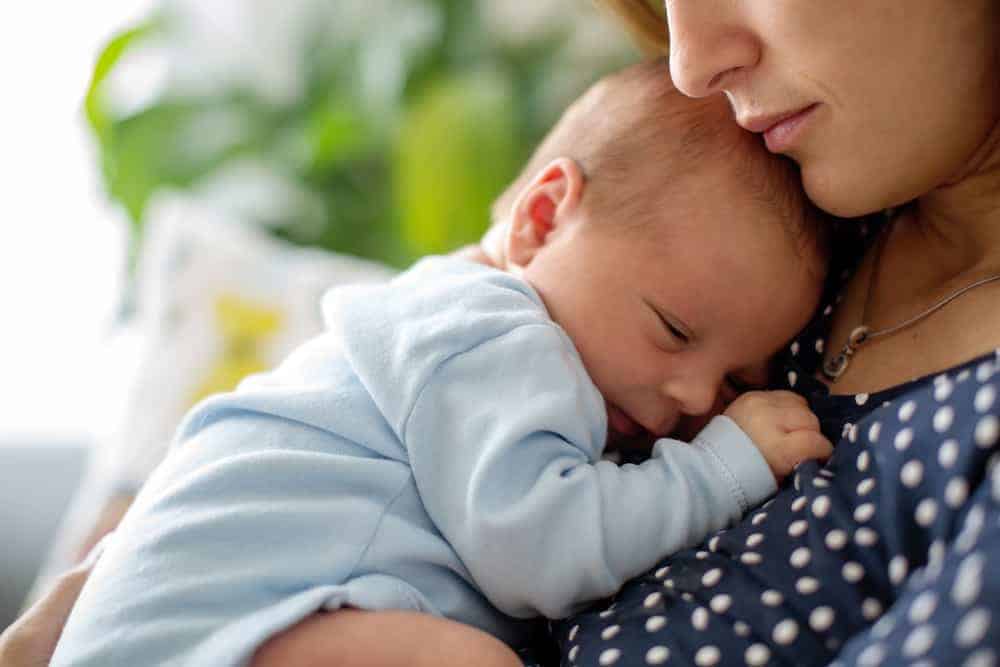
Babies are adjusting to their new environment and the world can be a harsh and scary place, compared to where they just came from. So babies may need gentle treatment during those first few weeks of life.
One of the most important things you can do for a baby is to keep the noise level down. Use a softer voice when speaking around the baby and don’t make any noises that may wake the baby from a nap.
Being overly animated, laughing too loud, yelling, swearing, or arguing can cause emotional distress for the baby (and the parents). Please be extra mindful to keep conversations calm and low around the baby and avoid having confrontational discussions in the baby’s presence.
Why Do We Need Rules for Visiting a Baby?
It’s important to establish a firm set of rules for visiting a newborn to honor what the family is experiencing and make this time of adjustment easier.
New parents need their village more than ever before—people in their corner who will be there for them. And the baby should be welcomed into a world of love, support, respect, safety, and friendship. They are going to need role models, stable relationships, and friendly, familiar faces as they grow up.
Let’s place ourselves in their shoes for a minute…
Delivering a baby is hard work, so mom will be recovering from the physical exhaustion of birth and labor. Some women have easy births and some have difficult deliveries and may struggle with birth-related trauma. But no matter how it went, the energy expended takes its toll physically and emotionally. Couple that with the fact that sleep is a commodity for new parents, and it should be abundantly clear that true rest and recovery can take weeks or months.
While one mom might want lots of visitors and help with changing diapers, another mom might need time to recover and may not be ready for anyone to hold her new baby.
She might also feel exhausted, sad, or just “off.” Postpartum depression and anxiety are far more common than anyone admits, and it is likely that the mom might be facing her own emotions and hormonal changes in the weeks after delivery.
At the very least, you can count on the fact that she is sleep-deprived, which can wreak havoc on anyone’s emotional well-being.
And on top of that, it takes a lot of effort for a new mom to get herself and her home ready or presentable for visitors. In addition to everything she has on her plate, this can be pretty taxing. New parents often have dishes in the sink and piles of laundry to put away, so the thought of having visitors can be stressful.
The baby is adjusting to life outside the womb. The womb was warm, dark, quiet, and it supplied all the baby’s nutrients and met her needs. But the outside world can be a loud, bright, cold, and scary place. Birth may have been a scary or difficult experience. Food doesn’t come instantly, and sleep is hard to come by. And who are all of these people? Why is it so uncomfortable and loud?
Being gentle and respectful of the baby is an absolute must. And if the birth was difficult, the baby may still be recovering as well.
Understandably, babies feel safest when cuddled up against their mom’s chest. They crave the warmth of their mom’s skin, her familiar smell, the sound of her voice, and the feeling of her heartbeat against their little bodies. Or they may want to nurse, a lot, even just for comfort. Newborns often just need that peace and quiet, held in their safe spot on mommy’s chest to feel entirely at ease.
Don’t forget that dad is going through a lot. Dads can struggle, too, and their needs are often set aside as they’re automatically placed into the role of support helper for mom and baby. It’s easy to forget about dad when all the focus is on the mom and baby, but he’s probably going through a lot as well. A simple acknowledgment of his efforts would probably go a long way.
Older siblings need to be noticed. If the baby has older siblings, they will also have a new role in their family—and they may not exactly be excited about how it turned out. All of a sudden, nobody is paying attention to them anymore. Visitors should be sensitive to this and help protect their emotions, too.
For example, you should always greet an older sibling before acknowledging the baby. And if you bring a gift for the baby, it’s nice to also bring something for their older sibling(s). A book or small toy would probably make them feel special and seen.
Overall, the whole family is going through a major life change. There are sleepless nights and early wakings, new routines, and not enough time to do the dishes or even think about self-care. Taking care of a baby is hard work. Having this new responsibility 24/7 is a lot for anyone to take on.
Not to mention, the parents are getting less quality time together and are adjusting to the major changes a new baby brings into their relationship, too.
So no matter what it looks like on the outside or on social media, it’s somewhat of a roller coaster ride. As much as you try to prepare for everything, no one could ever imagine in their wildest dreams what it’s really like to bring a baby into their lives until they get there, and it takes time to adjust to this new experience—one that’s filled with lots of love and cuddles but also great challenges.
As a beloved friend or family member, your job is to honor what they’re going through with your full understanding, patience, and respect.
Tips for Planning Your Visit
Now that we’ve covered the most important rules for visiting a baby, here are some helpful tips to keep in mind when planning your visit.
- Don’t assume that anyone (at all) is welcome to visit at the hospital. Most women don’t want to have visitors until they get home. Remember, mom is drained, exhausted, and physically only beginning her recovery from the birth. So please don’t assume that anyone (at all) is invited to see the baby in the hospital, including close family. I surveyed my readers, and only 11% of new moms were comfortable welcoming all friends and family that wanted to visit them at the hospital, while the rest either wanted no visitors at all (25%) or only a few select people they are really close to visiting them at the hospital (64%). (And if they had a home birth, please give them lots of extra time to accept visitors.)
- When is it okay to visit a newborn? Every family will have their own preferences for when they will accept visitors. Give them as much space as they need, and please don’t take it personally if you aren’t invited over right away. Some families choose to cocoon the baby for 40 days and not have any visitors or leave the house very much. Others may accept all visitors, while some may have a select list of people whose help and company they need. Some just want to be at home with their baby for the first few days or weeks before inviting anyone to meet the baby. I like to phrase it this way: “We are so eager to meet the baby! Please let us know when you are ready to have visitors.” If you’re a close family member, the conversation may be a little different, but don’t assume anything, and be sure to give the new parents room and the option to suggest to you when the best time would be for you to come for a visit.
- Always call before you visit. Never assume that you can drop by unannounced, even if the family had an open door policy before the baby was born. The newborn period can be difficult, and you just don’t know how mom and baby are doing that day, so it’s a lot of pressure to put on them. When you do call, text, or email them, be extra patient. It may take a lot longer than usual for them to respond. They are probably not even taking regular showers, much less answering their texts or emails!
- Honor the baby’s naptime and bedtime. Be flexible around the time of day you visit and realize that if the baby is sleeping when you arrive, the parents won’t wake the baby for your visit. Baby sleep is precious and hard to come by, and that’s why you never wake a sleeping baby to greet guests. Instead, you should expect to meet the baby after she wakes from her nap.
- Check before you bring anyone along with you. Be sure to ask the parents who you can bring with you to meet the baby. If you just started dating someone, for example, or are spending time with a friend that day, you should not bring them to meet the baby. Also, do not bring young children to visit a newborn unless the family specifically invites them over. Children, especially preschool and elementary age children, are sick frequently and don’t know how to practice good hygiene around a newborn. And newborns shouldn’t be exposed to germs because they don’t have much of an immune system yet. This is why it’s safest to leave the kids at home. Never, ever bring a child who is or has been sick or around someone who is sick.
- If possible, bring food for the family when you visit. It’s not necessary or expected, but it’s always appreciated when you bring some food. Most people bring dinners, but you might want to take over some homemade muffins or bagels and cream cheese from their favorite shop. (But be sure to ask if the family has any dietary restrictions. A lot of breastfeeding moms avoid dairy and soy, for example.) Anything would be helpful, and it is a very kind gesture. I know I appreciated it when thoughtful friends brought my family snacks or meals.
- Find ways to be helpful while you’re visiting. If you can offer to help the parents with something—anything—please do. Whether that means unloading the dishwasher, doing a load of laundry, taking the dog out, or picking something up from the grocery store, it can be a huge help. (Some parents will accept all offerings, and some might say no thank you. Don’t be offended if they don’t accept help—it’s not personal.) I felt grateful when someone made me a cup of hot tea while I nursed for hours on end. My heart was humbled when someone did my dishes or read to my older son. These are the gestures you don’t forget.
- Be extra considerate and don’t overstay your welcome. Similarly, be sure that you don’t impose on the parents during your visit. Don’t expect the visit to be centered around your needs. Pick up after yourself and make sure to help out as much as you can. Don’t stay too long, either. The baby probably has a ridiculously early bedtime (6 p.m. isn’t uncommon), and the parents are exhausted. If mom has to breastfeed the baby, that’s probably a good cue for you to leave, since it may take as long as 30 minutes or more. And if you are invited to stay with the family, assume that your visit is solely for the purpose of helping out and spending quality time with the family—not for your own entertainment and tourism. Don’t ask them to drive you places or take you sightseeing. Help around the house and with caring for the baby.
This is the Newborn Nine list of essential rules for visiting a newborn baby. I hope this list was eye-opening and helped you to navigate the process of visiting the new special baby in your life. Since I can’t quite cover every possible situation that might come up, I would leave you with the following gut-check rule:
When in doubt, always do what is best for the baby.


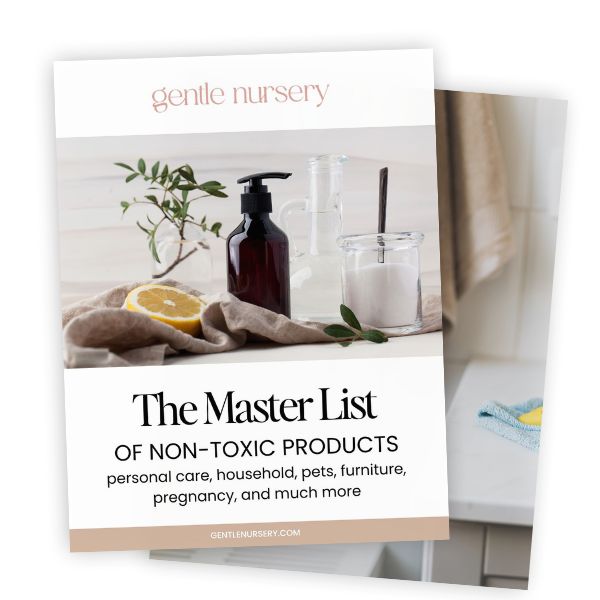
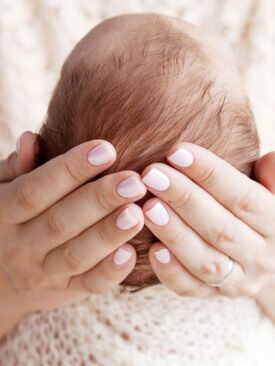
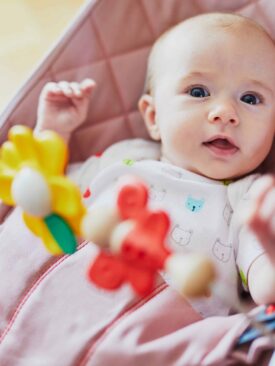
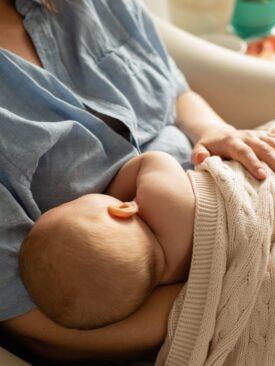
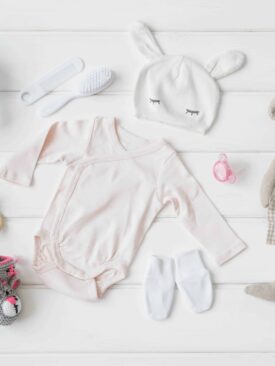
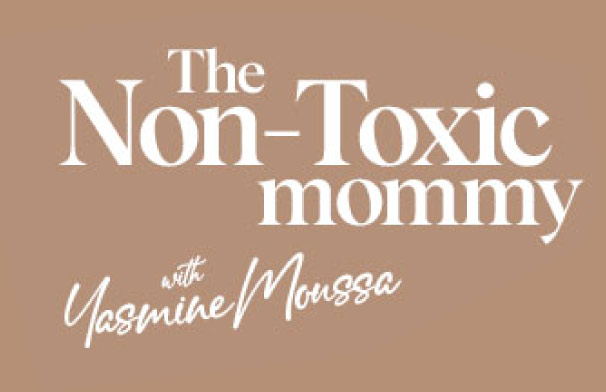



Leave a Reply